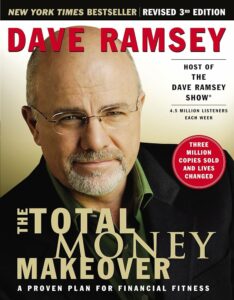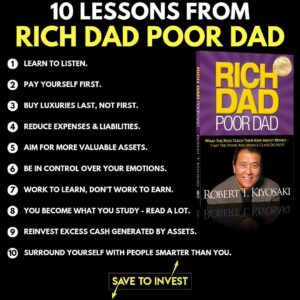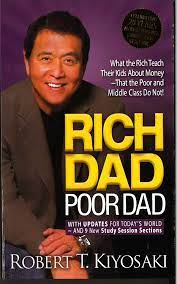Embarking on the journey of understanding finance can be both exciting and overwhelming. Whether you’re looking to manage your personal finances better, delve into investment strategies, or pursue a career in finance, starting with the right books can provide you with a solid foundation. Hères a curated list of some of the best books to kickstart your financial education:

1 : “The Total Money Makeover” by Dave Ramsey: Ramsey’s book offers practical advice on personal finance management. He outlines a step-by-step plan to get out of debt, build an emergency fund, and start investing for the future. With its straightforward approach and actionable tips, this book is an excellent starting point for those looking to take control of their finances.

2 :“Rich Dad Poor Dad” by Robert T. Kiyosaki: This classic bestseller challenges conventional wisdom about money and investing. Through anecdotes from his own life, Kiyosaki contrasts the financial philosophies of his “poor dad” (his biologi
cal father) and his “rich dad” (his best friend’s father). The book emphasizes the importance of financial literacy, investing in assets, and creating passive income streams
3 : “The Intelligent Investor” by Benjamin Graham: Considered the bible of value investing, this timeless book provides valuable insights into the principles of investing. Graham’s approach focuses on long-term strategies, margin of safety, and minimizing risk. Even though some of the examples may seem dated, the fundamental concepts remain relevant for investors of all levels
4 :“A Random Walk Down Wall Street” by Burton G. Malkiel: Malkiel’s book offers a comprehensive overview of various investment strategies, including technical and fundamental analysis, indexing, and behavioral finance. He argues for the efficiency of markets and advocates for a passive investing approach through index funds. This book is an essential read for understanding the nuances of investing in the stock market.
5 :“The Little Book of Common Sense Investing” by John C. Bogle: Bogle, the founder of Vanguard Group, espouses the virtues of low-cost index fund investing in this concise yet insightful book. He emphasizes the importance of simplicity, patience, and staying the course in achieving long-term investment success. This book is especially valuable for novice investors looking to build a solid investment portfolio.
6 :“Finance for Non-Financial Managers” by Gene Siciliano: For those seeking to understand finance within a business context, this book serves as an excellent introduction. Siciliano covers essential financial concepts such as financial statements, budgeting, and financial analysis in a clear and accessible manner. It’s an indispensable resource for managers and professionals from non-financial backgrounds
7 :“The Richest Man in Babylon” by George S. Clason: Set in ancient Babylon, this timeless classic presents financial wisdom through parables and stories. Clason imparts principles of saving, investing, and wealth accumulation that are as relevant today as they were centuries ago. This book offers valuable lessons in financial discipline and wealth building.
8 :“Your Money or Your Life” by Vicki Robin and Joe Dominguez: Robin and Dominguez challenge readers to reconsider their relationship with money and redefine what true wealth means to them. The book provides a nine-step program for achieving financial independence and aligning one’s spending with personal values and goals. It’s a thought-provoking read that encourages readers to take control of their finances and live more intentionally.
In conclusion, diving into the world of finance can seem daunting, but with the right resources, it becomes an exciting journey of learning and growth. Whether you’re just starting to manage your personal finances or aspiring to become a seasoned investor, these books offer valuable insights and practical guidance to help you navigate the complexities of finance with confidence. Remember, the key is not just to read but also to apply the knowledge gained to achieve your financial goals.






